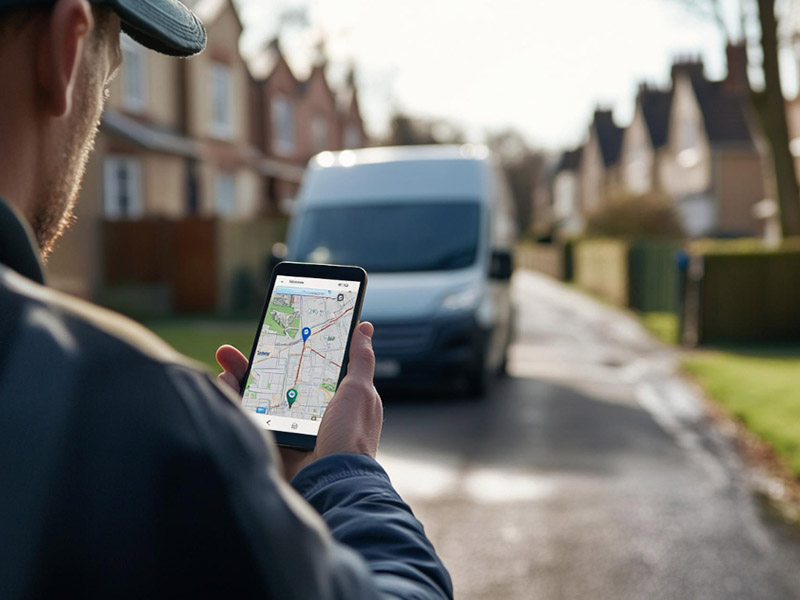Fleet Management System UAE:2025 Telematics & Green Trends

In the UAE, the fleet management system will totally change in 2025. Rising fuel prices, stricter safety rules, green energy shift end old methods. Success needs advanced technology, eco-friendly methods, lower costs, compliance, and safety
Digital transformation is pivotal, whether for a logistics firm shipping goods internationally or a car rental company with a large fleet. The rapid pace of fleet transformation in the UAE is being driven by the adoption of telematics, AI-powered predictive maintenance, and environmentally friendly vehicles. The following blog highlights the primary trends in fleet management in the UAE that will emerge in 2025. It will also explain how organizations can remain competitive.
Why Fleet Management is Changing in the UAE
Government Regulations:
The UAE government imposes regulations on road safety and pollution, as well as the management of vehicles. An example is the SecurePath system, which is mandated for some vehicles and the compulsory use of telematics systems for fleet tracking.
Sustainability Goal:
As part of the sustainability goals, businesses are encouraged to reduce emission rates to align with the UAE Vision 2031 and Net Zero 2050, and implement net-zero emission, eco-friendly fleet practices. Government initiatives to introduce electric and hybrid vehicles enhance initiatives for greener roads and have integrated eco-friendly initiatives into everyday practices for rapid fleet transformation.
Digital Transformation:
The UAE business has changed with the rapid advancements in the sectors of the Internet of Things, Artificial Intelligence, and big data analytics. The parameters for the integrated fleet transformation of the region will utilize the aforementioned technologies to track vehicles, predict problems, and provide operational efficiencies for the entire fleet. Digital dashboards along with mobile applications,s have now become integral components of operational fleet technologies.
Cost Pressures: Cost Pressures are due to high fuel prices, toll charge fees, and overall maintenance costs for fleet vehicles. The financial challenge of the rapid-paced market in the UAE removes the need to identify the limitations of the fleet cash flow through waste reduction, vehicle life extension, and route optimization.
Top 2025 Fleet Management Trends in the UAE
1. Telematics at the Core of Fleet Operations
Telematics will become a key part of fleet management system uae. It will be integrated into daily operations for better control. Real-time use will improve efficiency in every area. Vehicle location tracking will be enhanced, driver behavior closely monitored, and fuel consumption reduced. The completion standards of the vehicles will maintain elastic time reductions, cost management, and enhance the client services.
Why it matters in the UAE:
- Compliance: The Roads and Transport Authority (RTA) and SecurePath regulations require fleet operators to install telematics systems in certain categories of vehicles. However, this ensures proper tracking, safety monitoring, and adherence to UAE laws.
- Cost Efficiency:
Rising fuel and toll expenses make telematics critical for identifying waste. Fleet managers can track driver routes, control speed, and minimize fuel loss. Also, over time, these insights lead to significant savings. - Safety: Telematics boosts driver responsibility. Notifications about speeding and aggressive driving or lane discipline allow accidents to be prevented and road safety to be increased. This shields lives and saves businesses from hefty insurance claims.
To sum up, by 2025, telematics will go beyond simple GPS systems. This technology lays the telematics system to streamline fleet management in the UAE and achieve compliance, cost control, and safety.
2. AI-Powered Predictive Maintenance
AI-based predictive systems to determine necessary maintenance shift the traditional scheduled service intervals. The predictive maintenance technology assesses telematics and other data, identifies patterns, and uses them to pre-determine when a vehicle’s system will fail. This lets the fleet be serviced ahead of scheduled maintenance, not wasting time or leaving the fleet to be serviced due to breakdowns.
Predictive maintenance is extremely valuable in the UAE due to the combination of long vehicle distances and a hot desert climate. AI scans for common fail patterns like unusual engine vibration, dead batteries, and worn tires. Predictive maintenance saves time and resources and is vastly useful due to the extreme TC ranges.
Further still predictive maintenance mitigates the probability of unexpected incidents due to vehicle breakdowns. Fleet managers can strategize maintenance and repair activities well in advance without noticeably impacting the operations of the business. Predictive maintenance also adds to the overall vehicle lifetime, which translates to a better return on investment.
In the future, AI applications in predictive maintenance will determine the safety, reliability, and cost efficiency of vehicles in UAE fleets.
3. Green Fleet Initiatives & Sustainability
Sustainability in the UAE is a major driver of transformation in fleet management. Businesses are expected to minimize their carbon footprint and help the nation achieve its Net Zero ambitions. As a result, Green Fleet activities have become the core of every business. 2025 and beyond will see the implementation of comprehensive and transformative Green Fleet strategies.
- EV Integration: Fleet vehicles are now more frequently replaced with electric (EVs) and hybrid vehicles. As EV power charging stations are now practically available across Dubai, Abu Dhabi, and Sharjah, the region is now more suited to facilitating the use of EVs in daily operations. Moreover, the use of EVs in fleets is associated with decreased operational costs as well as decreased emissions.
- Emission Reporting: Government agencies now require businesses to submit verified information on emissions. Fleet software tracks CO₂ emissions and creates compliance documentation. This streamlines the process for businesses and demonstrates their commitment to sustainability.
- Eco-Driving Programs: Telematics facilitates eco-driving by examining acceleration, speed, and idling. Drivers receive information on fueling habits, which helps diminish fuel consumption, emissions, and idling time. Idling time produces unnecessary costs. This improves performance and helps cut down on expenses related to fleet operation.
In the UAE, it is undeniable that sustainability is a business responsibility and not just a passing trend. Government objectives are attained, and green fleets earn the trust of their clients.
4. IoT & Smart Sensors for Real-Time Monitoring
Smart sensors and the Internet of Things (IoT) technology are improving the operation of fleets in 2025. These tools provide real-time, detailed insight, enabling managers to oversee every facet of their vehicles.
- Cargo temperature: Cold chain logistics companies transit medicines, food, and perishable goods, and are required to transport them safely. IoT sensors are calipers for temperature logistics.
- Fuel levels and theft detection: Sensors to fuel cost and verify the tanks and fuel sensors to identify and verify theft. The sensors help to save businesses’ expenses and costs associated with fraud.
- Tire pressure: Smart tire sensors monitor air pressure and warn drivers of tire underinflation. Having tire pressure within the ideal range is good for safety, fuel consumption, and tire wear.
Integrating IoT technology enables fleets in the UAE to operate with improved smarts, safety, and reduced operating costs.
5. Automated Compliance Management
In the UAE, as is the world over, compliance set for commercial fleets is tough, and automated compliance management tackles this in the UAE. Automated compliance management for commercial fleets covers all compliance at local and federal levels, pointing to compliance drifts.
Fleet software provides tracking tools for transport managers to monitor driver permits, vehicle inspections, and insurance renewals with the required SecurePath. Automated systems reduce the risk of fines, drag reminder nets, and generate complaint file systems.
Automation ensures compliance is transparent and ready for audits. Businesses can provide digital proof in case of government checks instantaneously. This ensures smoother operations and builds trust with authorities.
Automated compliance is necessary for fleets in the UAE as it saves time, avoids penalties, and ensures road safety.
6. Smart Route Optimization with Toll Integration
With rising toll charges in Dubai and Abu Dhabi, smart route optimization is essential. In 2025, fleet systems will now integrate directly with Salik and DARB toll systems to calculate the best cost-saving routes.
- Traffic Prediction Models: Using AI, fleet software predicts traffic patterns and suggests alternative paths. This reduces delivery delays and fuel waste, especially during peak hours.
- Geofencing: Businesses can create digital boundaries around areas. This prevents unauthorized trips and ensures drivers stick to approved routes.
- Toll Cost Control: Integration with toll systems provides real-time cost tracking. Managers can compare toll routes against free alternatives and decide the most efficient option.
Smart routing helps UAE fleets deliver faster, save fuel, and cut toll expenses, keeping operations competitive.
7. Cybersecurity for Connected Fleets
The greater reliance of fleets on digital systems makes the issue of digital system cybersecurity more important. Disruption of business operations or data theft might arise from hacking attempts on the telematics or other IoT devices.
UAE businesses will adopt advanced security measures: encrypted communication, firewalls, and secure cloud storage, expected in 2025.
Employees will need to be trained, and regular software updates will be a requirement to keep digital systems secure.
Routine operations are not the only concern of cybersecurity. It will help to avoid hacked systems that will cripple vehicles or leak private customer information. UAE fleets with strong cybersecurity will be compliant, operational, and provide trust to their clients.
Read More: What are the benefits of a fleet management system
How UAE Businesses Are Adopting These Trends
Logistics: Transport companies use telematics and smart routing to handle cross-border deliveries efficiently. Cold chain fleets rely on IoT sensors to protect sensitive cargo.
Construction: Heavy equipment fleets adopt predictive maintenance to avoid costly breakdowns. Compliance automation helps meet strict safety rules on construction sites.
Rental Services: Car rental businesses use telematics to track usage, prevent theft, and ensure customer safety. Green initiatives, such as EV rental options, attract eco-conscious clients.
Quick Action Plan for Fleet Managers
- Enable telematics monitoring to gain real-time visibility.
- Adopt predictive maintenance powered by AI to reduce breakdowns.
- Activate sustainability dashboards to monitor emissions and eco-driving.
- Automate compliance for smooth and penalty-free operations.
By following these steps, UAE fleet managers can stay ahead of the competition in 2025.
FAQs
Q1: Do small fleets need telematics?
Yes, even small fleets benefit from telematics. It improves safety, reduces costs, and ensures compliance. Small businesses gain the same advantages as large fleets by using these tools.
Q2: Can telematics track EV performance?
Yes, modern telematics systems track EV charging, battery health, and energy usage. This helps businesses manage electric fleets effectively.
Q3: How do I ensure SecurePath compliance?
To comply, install approved tracking devices and use a certified platform. Automated systems make compliance easier and keep your records audit-ready.
Conclusion
The transition to digital and green technologies in the UAE fleet management software is progressing quickly. Telematics, AI-enabled predictive maintenance, eco-friendly fleets, IoT remote monitoring, cut fleet smart management, ensure regulations compliance, increase toll route coefficient optimization, cybersecurity, and integrated route optimization deliver efficiencies and protection.
UAE companies adopting these 2025 trends will achieve cost efficiencies, enhanced security, and improved sustainability. The future is smart, connected, and green, and it is time to act. Logistics and construction fleet and car rental operators will lose to fleets that adapt in the UAE’s competitive marketplace.
Read further: The flotilla IoT Guide to GPS Fleet Management Software


